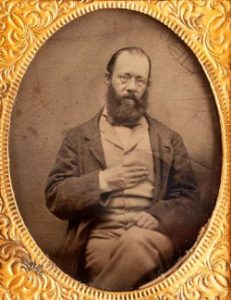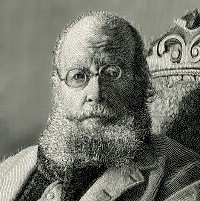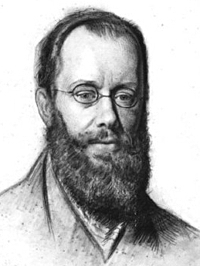Fleurs du Mal Magazine


Or see the index

There was an Old Man with a Beard
There was an Old Man with a beard,
Who said, “It is just as I feared!—
Two Owls and a Hen, four Larks and a Wren,
Have all built their nests in my beard.
Edward Lear
(1812 – 1888)
There was an Old Man with a Beard
• fleursdumal.nl magazine
More in: Archive K-L, Archive K-L, Children's Poetry, Edward Lear

Edward Lear
The Jumblies
They went to sea in a Sieve, they did,
In a Sieve they went to sea:
In spite of all their friends could say,
On a winter’s morn, on a stormy day,
In a Sieve they went to sea!
And when the Sieve turned round and round,
And every one cried, `You’ll all be drowned!’
They called aloud, `Our Sieve ain’t big,
But we don’t care a button! we don’t care a fig!
In a Sieve we’ll go to sea!’
Far and few, far and few,
Are the lands where the Jumblies live;
Their heads are green, and their hands are blue,
And they went to sea in a Sieve.
They sailed away in a Sieve, they did,
In a Sieve they sailed so fast,
With only a beautiful pea-green veil
Tied with a riband by way of a sail,
To a small tobacco-pipe mast;
And every one said, who saw them go,
`O won’t they be soon upset, you know!
For the sky is dark, and the voyage is long,
And happen what may, it’s extremely wrong
In a Sieve to sail so fast!’
Far and few, far and few,
Are the lands where the Jumblies live;
Their heads are green, and their hands are blue,
And they went to sea in a Sieve.
The water it soon came in, it did,
The water it soon came in;
So to keep them dry, they wrapped their feet
In a pinky paper all folded neat,
And they fastened it down with a pin.
And they passed the night in a crockery-jar,
And each of them said, `How wise we are!
Though the sky be dark, and the voyage be long,
Yet we never can think we were rash or wrong,
While round in our Sieve we spin!’
Far and few, far and few,
Are the lands where the Jumblies live;
Their heads are green, and their hands are blue,
And they went to sea in a Sieve.
And all night long they sailed away;
And when the sun went down,
They whistled and warbled a moony song
To the echoing sound of a coppery gong,
In the shade of the mountains brown.
`O Timballo! How happy we are,
When we live in a Sieve and a crockery-jar,
And all night long in the moonlight pale,
We sail away with a pea-green sail,
In the shade of the mountains brown!’
Far and few, far and few,
Are the lands where the Jumblies live;
Their heads are green, and their hands are blue,
And they went to sea in a Sieve.
They sailed to the Western Sea, they did,
To a land all covered with trees,
And they bought an Owl, and a useful Cart,
And a pound of Rice, and a Cranberry Tart,
And a hive of silvery Bees.
And they bought a Pig, and some green Jack-daws,
And a lovely Monkey with lollipop paws,
And forty bottles of Ring-Bo-Ree,
And no end of Stilton Cheese.
Far and few, far and few,
Are the lands where the Jumblies live;
Their heads are green, and their hands are blue,
And they went to sea in a Sieve.
And in twenty years they all came back,
In twenty years or more,
And every one said, `How tall they’ve grown!
For they’ve been to the Lakes, and the Torrible Zone,
And the hills of the Chankly Bore!’
And they drank their health, and gave them a feast
Of dumplings made of beautiful yeast;
And every one said, `If we only live,
We too will go to sea in a Sieve,—
To the hills of the Chankly Bore!’
Far and few, far and few,
Are the lands where the Jumblies live;
Their heads are green, and their hands are blue,
And they went to sea in a Sieve.
Edward Lear (1812 – 1888)
The Jumblies
fleursdumal.nl magazine
More in: Archive K-L, Edward Lear, LIGHT VERSE

Edward Lear
The Quangle Wangles Hat
On the top of the Crumpetty Tree
The Quangle Wangle sat,
But his face you could not see,
On account of his Beaver Hat.
For his hat was a hundred and two feet wide,
With ribbons and bibbons on every side
And bells, and buttons, and loops, and lace,
So that nobody ever could see the face
Of the Quangle Wangle Quee.
The Quangle Wangle said
To himself on the Crumpetty Tree,
Jam; and jelly; and bread;
Are the best food for me!
But the longer I live on this Crumpetty Tree
The plainer than ever it seems to me
That very few people come this way
And that life on the whole is far from gay!’
Said the Quangle Wangle Quee.
But there came to the Crumpetty Tree,
Mr. and Mrs. Canary;
And they said, Did you ever see
Any spot so charmingly airy?
May we build a nest on your lovely Hat?
Mr. Quangle Wangle, grant us that!
O please let us come and build a nest
Of whatever material suits you best,
Mr. Quangle Wangle Quee!’
And besides, to the Crumetty Tree
Came the Stork, the Duck, and the Owl;
The Snail, and the Bumble-Bee,
The Frog, and the Fimble Fowl;
The Fimble Fowl, with a Corkscrew leg;
And all of them said, We humbly beg,
We may build our homes on your lovely Hat,
Mr. Quangle Wangle, grant us that!
Mr. Quangle Wangle Quee!
And the Golden Grouse came there,
And the Pobble who has no toes,
And the small Olympian bear,
And the Dong with a luminous nose.
And the Blue Babboon, who played the flute,
And the Orient Calf from the Land of Tute,
And the Attery Squash, and the Bisky Bat,
All came and built on the lovely Hat
Of the Quangle Wangle Quee.
And the Quangle Wangle said
To himself on the Crumpetty Tree,
When all these creatures move
What a wonderful noise there’ll be!’
And at night by the light of the Mulberry moon
They danced to the flute of the Blue Babboon,
On the broad green leaves of the Crumpetty Tree,
And all were as happy as happy could be,
With the Quangle Wangle Quee.
Edward Lear (1812 – 1888)
The Quangle Wangles Hat
fleursdumal.nl magazine
More in: Archive K-L, Edward Lear, LIGHT VERSE

Edward Lear
How pleasant to know Mr. Lear
How pleasant to know Mr. Lear,
Who has written such volumes of stuff.
Some think him ill-tempered and queer,
But a few find him pleasant enough.
His mind is concrete and fastidious,
His nose is remarkably big;
His visage is more or less hideous,
His beard it resembles a wig.
He has ears, and two eyes, and ten fingers,
(Leastways if you reckon two thumbs);
He used to be one of the singers,
But now he is one of the dumbs.
He sits in a beautiful parlour,
With hundreds of books on the wall;
He drinks a great deal of marsala,
But never gets tipsy at all.
He has many friends, laymen and clerical,
Old Foss is the name of his cat;
His body is perfectly spherical,
He weareth a runcible hat.
When he walks in waterproof white,
The children run after him so!
Calling out, “He’s gone out in his night-
Gown, that crazy old Englishman, oh!”
He weeps by the side of the ocean,
He weeps on the top of the hill;
He purchases pancakes and lotion,
And chocolate shrimps from the mill.
He reads, but he does not speak, Spanish,
He cannot abide ginger beer;
Ere the days of his pilgrimage vanish,
How pleasant to know Mr. Lear!
Edward Lear (1812 – 1888)
How pleasant to know Mr. Lear
fleursdumal.nl magazine
More in: Archive K-L, Edward Lear, LIGHT VERSE

Edward Lear
(1812-1888)
The Owl and The Pussy-Cat
I
The Owl and the Pussy-cat went to sea
In a beautiful pea-green boat,
They took some honey, and plenty of money,
Wrapped up in a five-pound note.
The Owl looked up to the stars above,
And sang to a small guitar
‘O lovely Pussy! O Pussy, my love,
What a beautiful Pussy you are,
You are,
You are!
What a beautiful Pussy you are!
II
Pussy said to the Owl, ‘You elegant fowl!
How charmingly sweet you sing!
O let us be married! too long have we tarried;
But what shall we do for a ring?’
They sailed away, for a year and a day,
To the land where the Bong-tree grows
And there in the wood a Piggy-wig stood
With a ring at the end of his nose,
His nose,
His nose,
With a ring at the end of his nose.
III
‘Dear Pig, are you willing to sell for one shilling
Your ring?’ Said the Piggy, ‘I will.’
So they took it away, and were married next day
By the Turkey who lives on the hill.
They dined on mince, and slices of quince,
Which they ate with a runcible spoon;
And hand in hand, on the edge of the sand,
They danced by the light of the moon,
The moon,
The moon,
They danced by the light of the moon.
Edward Lear poetry
fleursdumal.nl magazine
More in: Archive K-L, Edward Lear, LIGHT VERSE
Thank you for reading Fleurs du Mal - magazine for art & literature